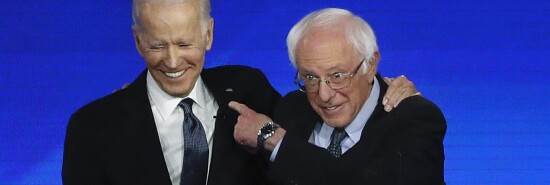
Republican courage now means dropping out, not staying in
Hugo Gurdon
Video Embed
The moment is fast approaching when Republican presidential contenders must act like Democrats — which means most of them bowing out of the primaries and supporting the candidate best placed to beat the guy they’re all afraid of.
In 2020, after Sen. Bernie Sanders (I-VT) won New Hampshire, a ghastly possibility rose before the eyes of senior figures in the Democratic Party. They realized to their horror that their rank-and-file members really might pick a socialist demagogue as their nominee, who’d get crushed in the general election.
THE LEFT’S LATEST CRAZY PLAN TO KEEP TRUMP OFF THE BALLOT
For senior Democrats, though, winning isn’t the most important thing — it’s the only thing. So, ex-Mayor Pete Buttigieg, who’d won 24.4% of New Hampshire votes, only 1.3 points behind the bogeyman, and Sen. Amy Klobuchar (D-MN), who’d come third with 19.7%, bowed to Joe Biden, who’d scraped up only 8.4%.
By pretending to be a resolute centrist alternative to the old Soviet sympathizer, Biden became the agreed candidate, scooped up everyone’s donors, and won South Carolina. Democratic voters who did not “feel the Bern,” or who anyway didn’t like it when they felt it, suddenly had nowhere else to go. They made do with Biden, and the rest, as they say, is history. So here we are.
The Republican predicament now is comparable, with former President Donald Trump in the role of demagogue, looking likely to lead the GOP to disaster in the 2024 election.
There are many important differences, of course. To name just two, Sanders hadn’t been repeatedly indicted for alleged federal and state crimes, and he didn’t lead his party’s primary field by 40 points or so, as Trump does. Another difference is that no rival candidate feared Sanders the way they fear Trump. Some Democrats could see that Sanders’s policies would be disastrous and were alarmed (although most quickly forgot that after Biden won the White House). But they didn’t worry about Don-like revenge coming their way if they coalesced against the primary leader, as Republicans today tremble at the prospect of crossing Trump.
Former New Jersey Gov. Chris Christie is the only explicitly anti-Trump candidate among them, although former Vice President Mike Pence and, to a lesser extent, Gov. Ron DeSantis (R-FL) are moving that way. But candidates such as Sen. Tim Scott (R-SC), who has carefully avoided direct opposition to Trump and who might look forward to a Cabinet position, has a clear personal disincentive to drop out and back DeSantis, for example.
The Democrats’ escape route from a looming electoral debacle was much clearer four years ago than the Republicans’ path back to safety and normalcy is today. And Republicans, being instinctively and ideologically in favor of competition, are more likely to have principled objections to speaking with one voice. It’s why Democrats are so much better at coordinating their messaging in pursuit of power.
It might also be objected that the process of winnowing to an agreed candidate is precisely what the primary season is for. Biden wasn’t agreed on until after Iowa and New Hampshire; the Democrats were more than five months further down the timeline when they closed ranks than Republicans are today.
But Republicans don’t have the luxury of time. If the party is to avoid disaster and avert another four terrible years of President Biden, its hopefuls cannot wait until Feb. 3, the date of the South Carolina primary, to rally to the candidate most likely to defeat Trump.
At present, that is still DeSantis. It may become Haley. But whoever it is must be decided on long before Iowa. The party needs to find its non-Trump champion before the end of October and thus give that person at least three months before the cornfield caucuses and gain momentum to top Trump in New Hampshire. It is to be hoped that over the next six weeks or so one of today’s rivals breaks out and becomes the obvious choice. But whether or not one of them does, they all have to acknowledge there is no merit in what the Wall Street Journal aptly called “vanity projects.”
Campaign success or failure usually come gradually. A candidate who drops out on the eve of Iowa knowing he or she is headed for fourth, fifth, or sixth, will be doing Trump a favor, but no one else. That would deserve their party’s scorn, not thanks.
Usually, staying in a fight is thought to be courageous. But that isn’t the case for Republicans today. It’s always been clear that only Trump gains and everyone else loses if there is a big field. But it is more pressing now than ever.
It will take much more courage, and the self-knowledge to ignore the flattery of well-paid campaign advisers, to defy Trump and act in the interests of party and country. That is what every Republican in the race claims as motivation. Now we need to see it translated into honorable action.
